The Ultimate Guide to IELTS Speaking Test 2024: Topics, Questions, Tips, and More
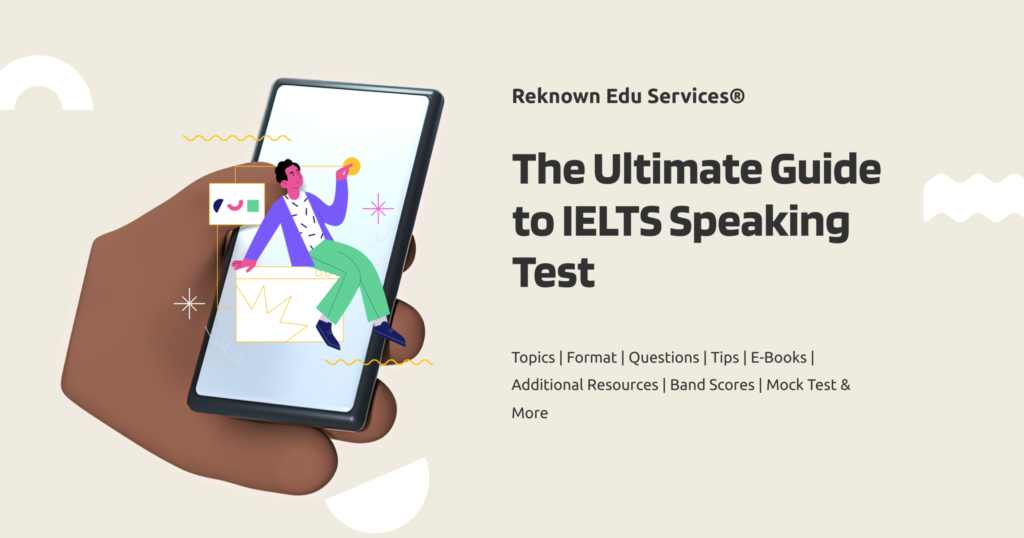
The Importance of IELTS Speaking Test in 2024
Imagine this: your heart is racing as your prepare to take the IELTS Speaking Test, an important component of the exam that evaluates your ability to communicate effectively and fluently in English.
As you take a deep breath, reminding yourself of all the opportunities awaiting if you achieve a higher score on this important examination.
Studying abroad, migrating to an English-speaking country and furthering your career are among the many opportunities open to you with a strong IELTS Speaking Test score.
That’s why preparation for this exam is key; to demonstrate proficiency in pronunciation, fluency, grammar and vocabulary as you work toward your goal.
Begin your IELTS Speaking Test journey now and prepare to experience its exciting rewards. With proper planning, you can secure the highest possible score and open doors to a brighter future.
Are you planning to give your IELTS exam in Bangalore?
Understanding the Format of the IELTS Speaking Test 2024
Once upon a time, there was a little boy named Timmy who wanted to study at a school where English was spoken but struggled to do so fluently. To demonstrate his English abilities he decided to take part in an IELTS Speaking Test; this would demonstrate his speaking proficiency.
The IELTS Speaking Test is like a game where you must talk for some time.
There are three parts to it; firstly, your teacher will ask some easy questions about yourself such as your name and location;
in part two they give a topic for discussion that allows you to say your piece and tell a story or give an example;
thirdly they pose more difficult questions about this second topic discussed during part two; finally a final round asks you more in-depth questions related to this second part discussed earlier on in part one.
To achieve success in the game, it’s necessary to speak up and use great words often and not be too quiet. By talking more and using good language, it will increase your score and help get into your desired school.
So if you want to play the IELTS Speaking Test game, practice speaking English a lot and just pretend when taking your exam that it is a conversation between friends – you will do great!
💡TIRED OF GIVING MULTIPLE IELTS EXAMS? Clear your IELTS exam with the help of chatGPT empowered classes?
How to Use this Guide in 2024
This guide has been created to aid your preparation for the IELTS Speaking Test. It will walk through its three components, provide sample questions and answers, offer tips for success, as well as offer resources for practice.
To make the most out of this guide, it is wise to follow these steps:
Read through the Introduction for an understanding of IELTS Speaking Test’s purpose and format, before reviewing each section in this guide starting with IELTS Part 1 to Additional Resources.
Take notes on all sample questions, tips, vocabulary lists and cue cards offered for each section of IELTS Speaking PDF preparation.
Practice mock tests and use cue cards to hone your speaking abilities before turning your focus back onto IELTS preparation as you would any exam.
By following these steps and dedicating sufficient effort and time for preparation, you can reach your target goal for IELTS Speaking Test success and open doors of opportunities in your future.
IELTS Speaking Part 1: Introduction and Interview

Understanding the Speaking Part 1
Part 1 of the IELTS Speaking Test is one of the easiest and most relaxed parts of the exam, testing your ability to discuss yourself, familiar topics and basic grammar/vocabulary.
During this stage, you will be asked a series of basic questions about yourself, your background and interests. All questions should be straightforward so that you feel at ease while answering them.
First, the examiner will introduce themselves and ask you to verify your identity before asking questions on three broad subjects: home, work/study and lifestyle. Questions will focus on personal experiences to elicit information about you.
Be mindful that Part 1 questions may depend on your background, culture and nationality; to prepare adequately, anticipate an array of inquiries and be able to discuss different subjects.
Part 1 provides you with an opportunity to demonstrate your fluency and confidence when speaking English.
One effective strategy for preparation involves anticipating questions the examiner may pose, then practicing answering them before practicing speaking in front of a mirror or with language partners to build up your confidence.
To achieve success in Part 1, it is necessary to speak clearly, use appropriate grammar and vocabulary, and provide detailed answers.
Avoid giving one-word answers or answers that are too brief; the examiner is looking at extended speech production; therefore it’s crucial that you continue talking until there’s nothing further to say on a particular topic.
Part 1 of the IELTS Speaking Test provides you with a chance to introduce yourself and discuss ideas with an examiner, showcase your communication abilities, and demonstrate familiar topics in English.
By carefully preparing and practicing speaking skills before taking Part 1, it can lead to success on test day.
Sample Speaking Questions Part 1 with Answers
Opinion Questions: [Problem statement]: What are your views on the importance of family? (Opinion Questions).
Formula: “This is my opinion because [give a reason or explanation].”
Example: “Families are essential parts of life, providing emotional support, love and care.
Unlock Success: Conquer IELTS Speaking with 50+ expert-curated topics. Overcome Challenges: Gain clarity, vocabulary and confidence quickly in minutes. Its Spend 45 Minutes Wisely to Transform your Speaking Abilities.
Secure Your Ultimate IELTS Speaking Opinion Based Questions Now! Click on the link to purchase them now!
Comparative Questions: Summing Up (Comparison Question) – When considering living arrangements between families and friends, what are their advantages and disadvantages?
Formula: “There are both similarities and differences between [subject 1] and [subject 2], one similarity being [provide an example], while one difference being [provide an example].”
Example: “There are both similarities and differences between living with family vs friends; both can offer companionship and support, yet family members tend to provide more assistance during times of need.”
Unlock Success: Master IELTS Speaking with 50+ expert-curated topics. Overcome Challenges: Gain clarity, vocabulary, and confidence quickly in minutes. Invest Wisely: Use 45 minutes to transform your speaking abilities!
Get your Ultimate IELTS Speaking Comparison questions Now!
Advantages/disadvantages questions: What are the advantages and disadvantages of having a large family?
Formula: “One advantage of [subject] is [provide an example], while its disadvantages include [provide examples].”
Example: “One advantage of having a large family is having many people to talk with and share experiences. However, having multiple people means it may be challenging to find private moments alone.”
Unlock Success: Master IELTS Speaking with 50+ expert-curated topics. Overcome Challenges: Gain clarity, vocabulary and confidence quickly in minutes. Spend 45 Minutes Wisely for Maximum Transformation of Speaking Abilities.
Get the Ultimate IELTS Speaking Advantages/Disadvantages-based questions now!
Crucial Speaking Tips for Part 1 Success
Here are some key strategies for IELTS Speaking Part 1 success.
- Be confident and relaxed: Part 1 is intended to be an easy introduction to the test, so don’t let nerves affect you too much. Take a deep breath, relax, and try speaking naturally as possible.
- Speak Clearly: To achieve maximum marks on the IELTS Speaking Test, clear pronunciation is paramount. Make sure that your words are properly articulated and avoid speaking too quickly.
- Be ready to discuss multiple topics: Your examiner may ask questions related to your background, interests and experiences – make sure you prepare for multiple topics so you’ll be ready to give more details about yourself in detail during an examination session.
- Build up an impressive vocabulary: For IELTS Speaking Part 1, you are expected to utilize common terminology related to familiar topics. Therefore, ensure you possess an expansive range of lexicon that you practice using appropriately in context.
- Provide Details Answers: In order to score well in Part 1, it is crucial that you provide extensive answers to each question. Avoid short or one-word responses that don’t support your case and give ample details and examples that back your answers up.
Mind you!
- Request Clarification When Needed: If a question doesn’t make sense or needs repeating, don’t be afraid to seek clarification; rather than providing incorrect answers it is better for all parties involved if more is known about what was asked of you.
- Be Aware of Your Body Language: Body language can play an integral part in determining your score in the IELTS Speaking Test, so ensure to maintain eye contact with the examiner, sit up straight, and use natural gestures when appropriate.
By applying these tips and honing your speaking abilities, you can achieve success in IELTS Speaking Part 1. Additionally, this practice will set the foundation for further success throughout the test.
IELTS Speaking Part 2: Long Turn
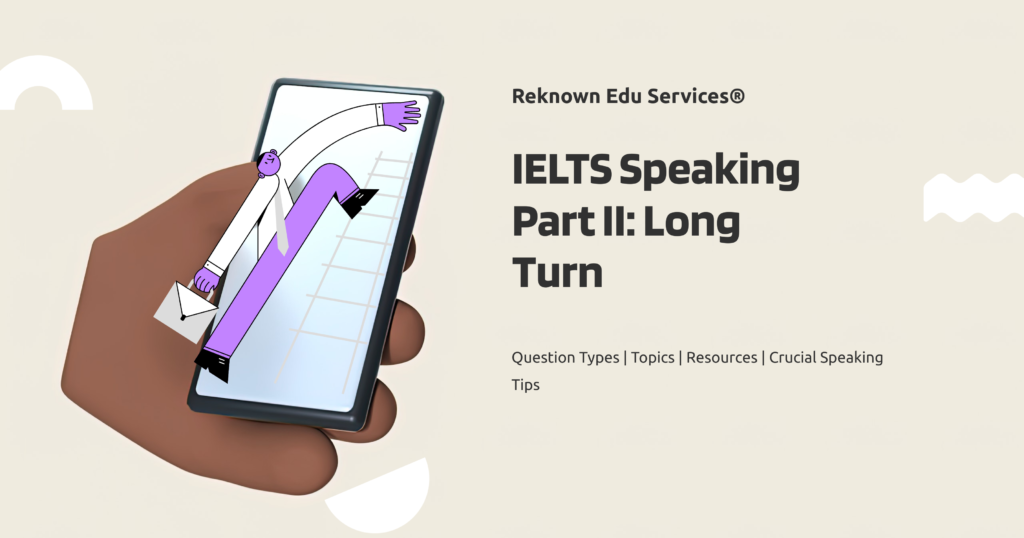
Unpacking the Speaking Part 2
Part 2 of the IELTS Speaking Test entails being given a cue card with a topic and some prompts that will assist in structuring your response. You have one minute to prepare your response before speaking for up to two minutes on this topic.
This section assesses your ability to speak at length about a given subject while organizing thoughts effectively while employing appropriate vocabulary and grammar structures.
To be successful at Part 2, it’s vitally important to maximize the one minute of preparation time you are given. Begin by reading over both topic and prompts carefully and identifying key points you want to address in your response; use prompts as structure points so your response covers everything necessary.
As part of any presentation, it’s essential to introduce the topic and provide background information so your response will make sense. Once familiar with the prompts, use them as guides for your responses. Speak clearly at a natural pace while using appropriate terminology and grammar.
Remember,
If you want to ensure you speak for two full minutes, using linking words and phrases that connect your ideas can help ensure it flows seamlessly. These may include “however”, “in addition”, and “finally”.
Part 2 of the IELTS Speaking Test provides you with a chance to demonstrate your ability to speak for an extended time on any given topic using appropriate vocabulary and grammar.
By carefully preparing, using prompts as guides, and responding promptly with structured responses you can excel in this section and achieve success in the IELTS Speaking Test.
You could read IELTS speaking Topics Questions & Answers for free
Popular Speaking Types with Answers for Part 2
Descriptive Questions:
These questions require you to describe something, person or place in detail for the listener to understand. These may involve using descriptive language such as: “Can you recall any memorable holidays you have had?”.
Unlock Success: Master IELTS Speaking with 50+ expert-curated topics. Overcome Challenges: Gain Clarity, Vocabulary, and Confidence Instantaneously. Spend 45 Minutes Transforming your Speaking Abilities.
Now! Get the Ultimate IELTS Speaking Descriptive-based Questions now!
Narrative Questions:
These types of questions require the speaker to recount an experience they have had, providing a beginning, middle, and end for their story. As an example: “Can you share an instance when making difficult decisions was difficult for you?”
Unlock Success: Master IELTS Speaking with 50+ expert-curated topics. Overcome Challenges: Gain clarity, vocabulary and confidence quickly in minutes. Invest Wisely: Spend 45 minutes to improve your speaking capabilities!
Get the Ultimate IELTS Speaking Narrative Based Questions now! – https://reknownedu.com/product/ielts-speaking-part-2-narrative-based-questions/
Comparison Questions:
These types of questions require the speaker to compare and contrast two or more things, people, or places and identify similarities and differences before providing a detailed analysis.
An example could include “Compare and contrast the education system of your country with that of another.”
Unlock Success: Master IELTS Speaking with expert-curated topics covering over 50 of them. Overcome Challenges: Gain clarity, vocabulary, and confidence instantly! Spend 45 Minutes Wisely To Transform Your Speaking Abilities.
Grab The Ultimate IELTS Speaking Comparison Based Questions Now!
Here is a list of 50 common topics that are often asked in the IELTS Speaking module:
Hometown | Family | Friends |Work/study |Music | Films/TV | Books/reading | Sports/exercise | Food/cooking | Shopping | Travel | Holidays | Health | Technology | Social media | Communication | News/current events | Environment | Animals | Art | Museums/galleries | Photography | Festivals and celebrations | Languages | Childhood memories | Future plans |
Dreams/ambitions | Fashion/clothing | Money | Housing | Cars/transportation | Leisure time | Daily routine | Weather | National identity | culture | Jobs/careers | Education | Science | Space exploration | Creativity | Childhood toys | Personal goals | Cultural differences | Globalization | Marriage/relationships | Etiquette | Entertainment | Social problems | Physical appearance | Personality traits
Remember that these are just examples of possible topics and the actual questions may vary. It’s important to prepare yourself by practicing speaking about a variety of topics.
Essential Speaking Tips for Part 2 Triumph
Here are some essential strategies for success in IELTS Speaking Part 2.
- Prep Carefully: Since Part 2 requires you to speak at length on an assigned topic, preparation is key. Practice speaking on various subjects while using prompts on your cue card as guides for structuring your response.
- Use the one-minute preparation time wisely: Use this one minute of preparation time wisely by reading carefully through the topic and prompts, identifying key points that need to be covered in your response, brainstorming vocabulary and grammar structures that could enhance it, etc.
- Speak Clearly and Naturally: To have success on the IELTS Speaking Test, clear pronunciation and natural speech are both vitally important. Try speaking at an easy pace while pronouncing all words correctly.
- Be Sure to Practice Appropriate Grammar and Vocabulary in Context: Part two requires using appropriate vocabulary and grammar structures in context to effectively convey your ideas. Be sure to practice using an array of vocabularies and structures.
Bet, you cannot miss these:
- Link Your Ideas Together: When speaking for two minutes or longer, using linking words and phrases such as “however”, “in addition”, and “finally” to keep the dialogue moving can help keep things flowing smoothly.
- Examples of such linking words/phrases could include “however”, “in addition”, and “finally”.
- Provide Specific Examples and Explanations: In order to score well in Part 2, it’s crucial that you provide concrete examples and explanations to support your ideas. Use specific information and personal experiences as examples when explaining points.
- Practice under timed conditions: To prepare for the time constraints of Part 2, practice speaking on any given topic for two minutes under timed conditions. This will build endurance and confidence needed to excel in this section.
By following these tips and practicing your speaking abilities, you can ensure success on IELTS Speaking Part 2, setting yourself up for future test-taking success.
💡TIRED OF GIVING MULTIPLE IELTS EXAMS? Clear your IELTS exam with the help of chatGPT empowered classes?
IELTS Speaking Part 3: Discussion
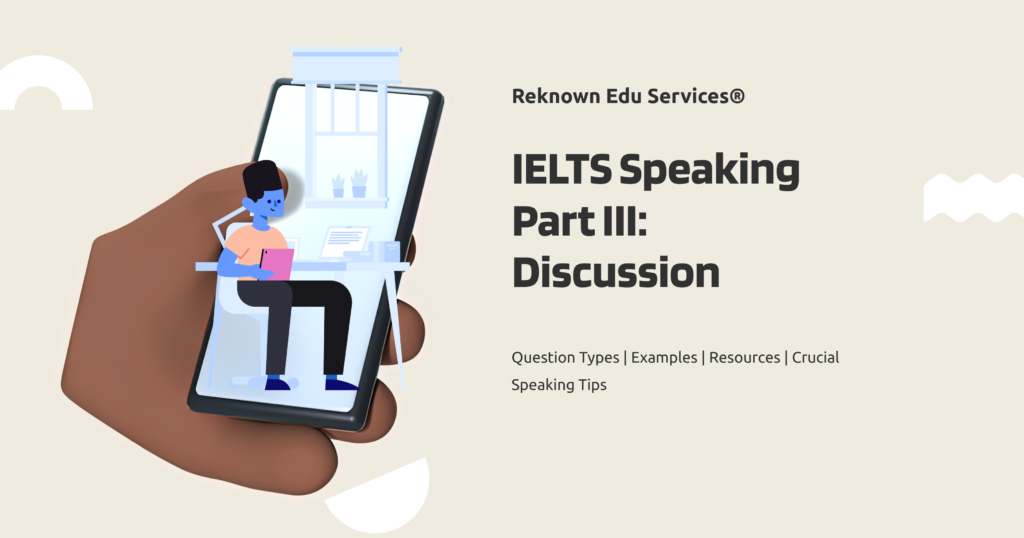
Demystifying the Speaking Part 3
IELTS Speaking Part 3 is the final stage of the speaking test, where an examiner engages you in more in-depth dialogue on a topic introduced in Part 2.
This section evaluates your ability to express and support opinions, provide explanations, and maintain coherent conversation over time. By understanding its format and expectations, Part 3 should help you approach it confidently for maximum score achievement.
Part 3 involves answering a series of questions based on your Part 2 cue card topic, designed to encourage you to express your opinions, provide examples and discuss broader issues related to it.
Your examiner is looking for your ability to express ideas clearly while using an assortment of vocabulary and grammatical structures as well as construct coherent arguments.
To excel in Part 3, it is vitally important that you actively engage in the dialogue. Listen closely when answering the examiner’s questions and formulate meaningful replies.
Take time to gather your thoughts before responding and express them clearly when giving an opinion; use linking words or phrases such as “in my opinion,” “on one hand” and “however” for cohesive flow when responding.
Common Speaking Topics with Answers for Part 3
Here is a list of 50 common topics that are often asked in the IELTS Speaking module:
Hometown | Family | Friends |Work/study |Music | Films/TV | Books/reading | Sports/exercise | Food/cooking | Shopping | Travel | Holidays | Health | Technology | Social media | Communication | News/current events | Environment | Animals | Art | Museums/galleries | Photography | Festivals and celebrations | Languages | Childhood memories | Future plans |
Dreams/ambitions | Fashion/clothing | Money | Housing | Cars/transportation | Leisure time | Daily routine | Weather | National identity | culture | Jobs/careers | Education | Science | Space exploration | Creativity | Childhood toys | Personal goals | Cultural differences | Globalization | Marriage/relationships | Etiquette | Entertainment | Social problems | Physical appearance | Personality traits
Keep in mind that these are simply examples and your specific questions may vary; practice speaking on various subjects will help ensure a smooth conversation.
Example Topics:
Education Question: What are the Advantages and Disadvantages of Studying Abroad?
Answer: Studying abroad offers the chance to discover new cultures, enhance language abilities and gain global perspective – yet can also be costly, require adjustment to a different environment, or cause homesickness.
Technology Question: How has technology influenced how we communicate?
Answer: Technology has revolutionized communication by making instant messaging, video calling, and social media platforms available – making communication faster and more convenient while some may argue it has decreased face-to-face interactions.
Environment Question: What are the primary sources of environmental pollution?
Answer: Pollutants released into the air, water, and soil due to industrial emissions, vehicle exhaust emissions, improper waste disposal practices and deforestation can all contribute significantly.
They release toxic pollutants which have detrimental impacts on our air, water, soil quality and environment as a whole.
Master IELTS Speaking: With our Ultimate IELTS Speaking Bundle, you have access to 6 expert-crafted eBooks covering 50+ topics as well as an extensive Q&A section in order to excel in your IELTS Speaking exam.
Transform Your Skills: Gain powerful techniques to generate ideas, expand vocabulary, and express yourself clearly and precisely. Learning these tools won’t simply result in memorization but will give you lifetime skills!
Invest in Your Future: Spend just 45-60 minutes per eBook to discover an abundance of inspiration and ideas. Purchase the Ultimate IELTS Speaking Bundle now to start on your journey toward speaking excellence – success awaits!
Click here
Top Speaking Tips for Part 3 Victory
Here are a few key IELTS Speaking tips specifically aimed at helping candidates excel in Part 3.
- Listen carefully: Be attentive as the examiner presents his or her question in order to fully comprehend its topic and purpose. Take some time before responding, in order to gather your thoughts and make an intelligent response.
- Make Your Answers More Comprehensive: Part 3 requires more in-depth responses compared to Parts 1 and 2, so aim to provide comprehensive responses by including relevant examples, explanations and supporting evidence in your answers. This shows your ability to generate ideas while contributing meaningful dialogues.
- Use a Diverse Vocabulary: Exhibit your vocabulary resource by including various vocabulary words and phrases into your answers, including synonyms, idiomatic expressions and academic or specialized jargon.
- Express Your Opinions with Justifications: Part three often requires expressing and providing reasons or justifications for your viewpoints. Be sure to state them distinctly while providing supporting arguments from logical thought experiments, personal experiences or pertinent facts and statistics to back them up.
- Practice active listening and follow-up questions: During a conversation, an examiner may pose follow-up questions based on your responses. Pay close attention and listen carefully as follow-up inquiries come your way; respond thoughtfully while building upon previous answers and covering any new points raised.
These are even more important
- Use suitable linking words and phrases: Increase the coherence and cohesion of your speech by strategically choosing appropriate linking words and phrases to enhance coherence and cohesion of your discourse by connecting ideas, offering opposing views, providing examples or showing cause-and-effect relationships.
- Engage in a Balanced Discussion: Demonstrate your ability to consider multiple perspectives by exploring both advantages and disadvantages, differing viewpoints or competing ideas related to your topic. Doing this demonstrates your critical thinking abilities as well as ability to analyze complex issues.
- Fluency and Natural Speech: Strive for smooth and natural speech flow by avoiding long pauses or hesitations and speaking at a moderate pace. When conversing, practice speaking confidently yet relaxedly so you maintain fluency throughout the conversation.
- Manage Your Time Effectively: As Part 3 has a time limit, make sure that you use it wisely. Avoid spending too much time on any one question as the exam requires covering multiple subjects simultaneously. If necessary, politely request that the examiner move on to another question.
- Be assured and positive: Approach Part 3 with confidence and positivity, keeping a level head when facing challenging questions from examiners. Remember they’re testing your communication abilities rather than your knowledge about specific topics.
By following these tips, you can improve your chances of performing well on IELTS Speaking Part 3 and reaching your desired score in your test.
Remember to practice regularly, become acquainted with common topics, and develop speaking skills so as to feel more confident expressing thoughts and ideas during your exam.
IELTS Speaking Vocabulary and Idioms
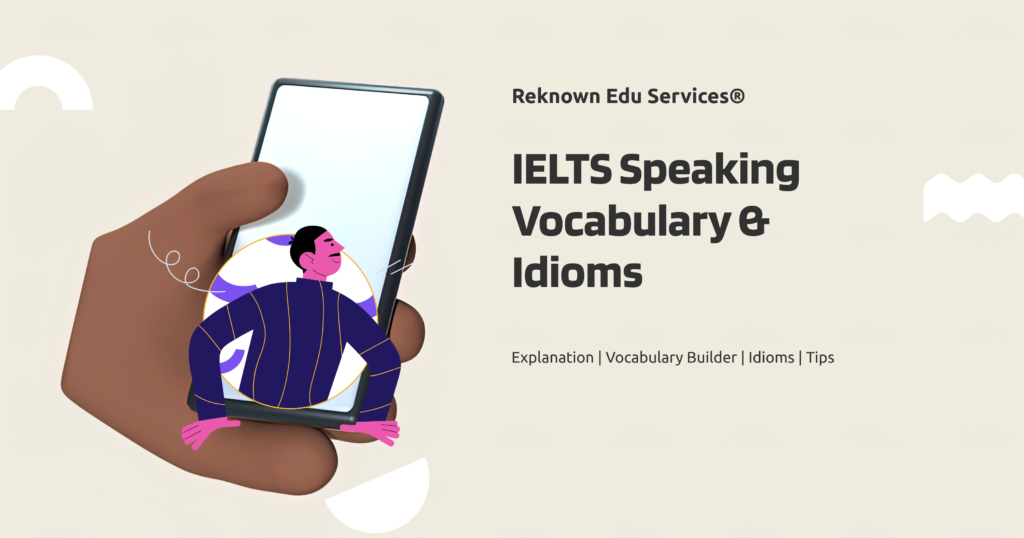
The Role of Vocabulary in IELTS Speaking
Vocabulary plays a central role in IELTS Speaking exam as it contributes to your overall language proficiency and can drastically affect your score. Here are a few key points highlighting its significance for your performance on IELTS Speaking test.
Lexical Resource
- Vocabulary is one of the four criteria assessed during an IELTS Speaking test, and demonstrating an expansive vocabulary shows your ability to express yourself effectively and accurately, contributing towards a higher score in this category.
Communicative Effectiveness
- Utilizing a diverse vocabulary allows you to articulate your thoughts more precisely and vividly, making your responses more compelling for an examiner.
Fluency and Cohesion
- Utilizing a diverse vocabulary enhances your ability to link ideas in order to form coherent streams of speech, with appropriate transition words and phrases helping improve coherence and cohesion within responses.
Flexibility When Expressing Ideas
- An extensive vocabulary provides you with a diverse collection of words and phrases to describe different concepts, express opinions and discuss various topics with greater depth and accuracy.
- This allows you to respond more readily and accurately to questions from others.
Contextual Understanding
- Building up your vocabulary can help you interpret different contexts more easily and interpret questions, prompts, and examiner’s instructions accurately, leading to more relevant and appropriate responses from you.
Precision and Accuracy
- Vocabulary can assist in conveying your intended meaning clearly, helping to avoid vague or generic terminology in favor of more specific and pertinent vocabulary to communicate your ideas accurately.
Enhance Speaking Band Score
- By expanding and diversifying your vocabulary, utilizing it effectively in IELTS Speaking test shows your language proficiency and can contribute towards attaining a higher band score.
- Doing this demonstrates fluency as well as an impressive lexical resource.
It’s essential to develop your vocabulary for the IELTS Speaking test through regular vocabulary-building activities, such as reading widely, keeping a vocabulary notebook, practicing word associations and using online resources like flashcards or vocabulary apps.
In addition, learning collocations, idiomatic expressions and synonyms will expand your language repertoire and improve results.
Always ensure your vocabulary usage fits naturally within the context of your responses. Finding a balance between using vocabulary effectively and maintaining fluent, coherent speech remains key for effective communications.
Power-Packed Idioms for IELTS Speaking Success
Idioms are an integral part of language, and can greatly strengthen your speaking abilities for IELTS tests. Here are a few powerful idioms to help you prepare for and pass the IELTS Speaking section of your exam.
- “Break a Leg”: This idiom means “Good luck,” and is often used when wishing someone success at an important performance or event.
- When something is described as being “a piece of cake,” this implies it should be easy and straightforward for them.
- “Bite the Bullet”: This expression refers to approaching difficult or unpleasant situations with courage and resolve.
- “Cost an Arm and a Leg”: Something which costs “an arm and a leg” means it is extremely costly and therefore an extremely valuable investment.
- “Hit the nail on the head”: This phrase refers to accurately or precisely identifying or expressing something. When someone
- “joins or supports a trend or opinion”, they join or support it by joining on with what has become popular or supported as trend.
- “The ball is in your court”: This idiom indicates it is now up to someone else to act or make decisions.
- “Burning the midnight oil”: This phrase refers to working or studying into the night hours.
- “Give someone the benefit of the doubt”: To “give someone the benefit of the doubt” is to believe or trust them even though you may harbor suspicions or uncertainties about them.
Want a few more? Here you go –
- In a nutshell: This idiom refers to summarizing something quickly or briefly.
- “Put All Your Eggs in One Basket”: This phrase describes placing too much confidence or trust in any single thing or plan, which may prove risky.
- When someone “steals the show,” this means they receive most attention or praise during an event or situation.
- “To Kill Two Birds with One Stone”: This idiom refers to accomplishing two tasks at the same time or by taking just one action.
- If someone says you “pull their leg,” that means they tease or joke with you lightheartedly.
- Finally, “Raining Cats and Dogs” describes heavy rainfall.
Always be mindful that while idioms may add texture and expression to your speech, it’s key that they are used correctly and in context.
Take time to understand each idiom’s meaning and usage before including them into responses during an IELTS Speaking test. Practice natural idiom usage to show off your language proficiency and impress the examiner!
Building Your IELTS Speaking Vocabulary Arsenal
Building an effective vocabulary arsenal is key for success in the IELTS Speaking Test. Here are some effective strategies that can help build it up.
Read Generally:
- Engage in widespread reading across a range of topics – newspapers, magazines, books, and online articles. This exposes you to new vocabulary while helping you understand its application in context.
Employ Vocabulary Resources:
- Utilize vocabulary resources like word lists, flashcards and online platforms specifically designed for IELTS preparation to hone vocabulary that commonly appears on the exam. These resources offer targeted vocabulary used during IELTS test-taking.
Repetition Builds Word Families:
- Instead of memorizing individual words, try learning entire groups or families of similar words instead. This allows you to better comprehend different forms of the same word (e.g. nouns, verbs and adjectives), while expanding your vocabulary effectively.
Learn Collocations:
- Pay attention to common word combinations or collocations that improve accuracy and fluency when speaking English. Observing them helps build vocabulary knowledge which increases accuracy and fluency during spoken conversations.
Contextual Learning:
- When studying a new vocabulary word or phrase in its context rather than alone, this helps you understand how words are commonly used and increases your ability to incorporate them correctly into speech.
Utilize Online Resources:
- Leverage online vocabulary-building apps, websites, and quizzes to bolster your learning and expand your vocabulary further.
Practice Word Association:
- Create connections between unfamiliar words and concepts you already understand to aid memory retention and retrieval during speaking test time. This method facilitates memorization and retrieval.
Put New Words Into Context:
- Putting new vocabulary words into sentence- and dialogue-based practice helps deepen your understanding of their meaning and proper usage.
Maintain a Vocabulary Journal:
- To strengthen your learning of new words and help deepen their retention, create a vocabulary journal or notebook in which to record new ones with definitions and example sentences.
- Revisiting them regularly is crucial in reinforcing this part of your studies.
Engage in Speaking Practice:
- Engage in mock speaking tests or conversation practice sessions with a partner or tutor, using your expanded vocabulary actively during these sessions for maximum gain in confidence and fluency.
Utilizing New Vocabulary in Writing:
- Include new vocabulary into written tasks such as essays or letters in order to expand and strengthen your understanding and application of these terms in a variety of situations.
- Doing this helps solidify how these new words will fit into various situations.
Remind yourself that the goal is not simply learning new words but incorporating them naturally into your speaking style. Pay particular attention to understanding meaning, usage and nuances of each word while striving for accuracy and precision in your communication.
Regular exposure and practice with various vocabulary will enable you to build up an impressive arsenal for the IELTS Speaking test.
💡TIRED OF GIVING MULTIPLE IELTS EXAMS? Clear your IELTS exam with the help of chatGPT empowered classes?
Understanding IELTS Speaking Band Descriptors
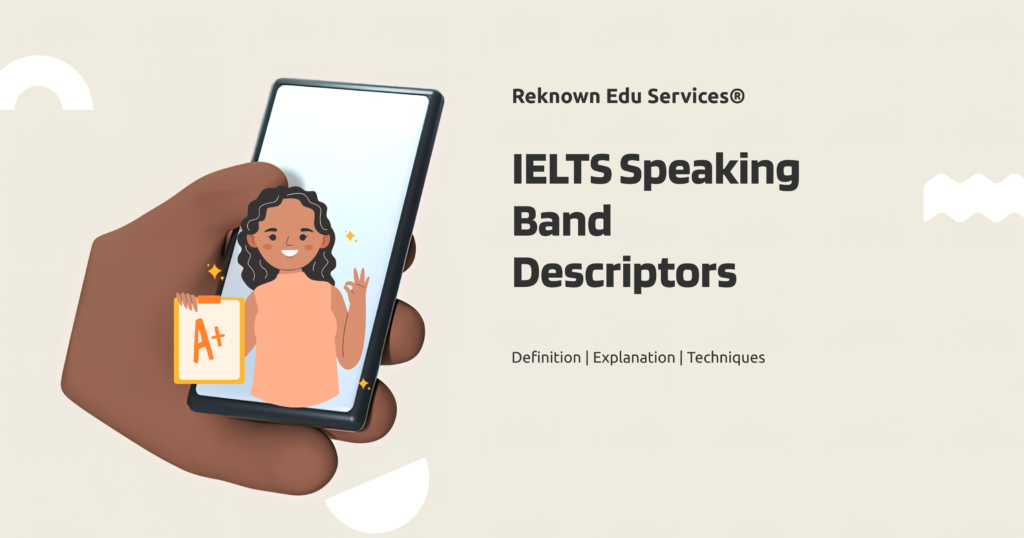
What are Speaking Band Descriptors?
IELTS Speaking band descriptors are guidelines issued by the International English Language Testing System (IELTS) to evaluate candidates in its Speaking test.
The band descriptors use four criteria – Fluency and Coherence, Lexical Resource, Grammatical Range Accuracy Accuracy and Pronunciation – as measuring points of assessment.
Fluency and Coherence:
- This criterion assesses a candidate’s ability to speak clearly, with no hesitations, pauses or incoherent ideas connecting their thoughts coherently. It takes into account factors like hesitations, pauses and their ability to connect ideas coherently.
Lexical Resource:
- Lexical Resource measures the candidate’s vocabulary range and accuracy by looking at how often specific words were used, their appropriate usage in context, as well as their control of word selection/collocations.
Grammatical Range and Accuracy:
- This criterion assesses a candidate’s grammatical skills by assessing their ability to employ a wide array of grammatical structures accurately, demonstrate control over tenses and sentence structures as well as correctly order words in sentences.
Pronunciation:
- Pronunciation testing evaluates an applicant’s ability to produce clear and understandable speech, including individual sounds pronunciation, stress placement, intonation patterns and overall clarity of speech.
- It measures factors like individual sound pronunciations, stress placements and overall clarity of delivery.
Criterion are scored from 0-9 with 9 being the maximum possible score. Band descriptors provide information on performance at each band level to allow examiners to assess candidates’ speaking skills and assign an appropriate score.
Noting the distinction is crucial: Band descriptors focus on the quality of language produced by candidates rather than content or ideas expressed, so even if a candidate holds strong opinions or ideas they must demonstrate these through their language skills according to band descriptors for maximum score.
Familiarizing yourself with the IELTS Speaking test’s band descriptors will enable you to better comprehend its expectations and prepare accordingly to fulfill criteria for each band level.
By prioritizing fluency, vocabulary, grammar, and pronunciation in your preparation you may increase the odds of attaining higher band scores on your Speaking exam.
How Band Descriptors Influence Your Speaking Score
Band descriptors play an essential part in determining your IELTS Speaking score. Let’s explore how these descriptors influence scores for different bands:
Band 6:
Your responses demonstrate some ability to communicate, while there may be restrictions or inconsistencies in your replies. Here are some key characteristics:
- Fluency and Coherence: You are capable of carrying on conversations, although with some effort. There may be hesitations or repetitions.
- Lexical Resource: Your vocabulary use is basic with limited range and accuracy; errors and inappropriate word choices may occur from time to time.
- Grammatical Range and Accuracy: You demonstrate a mix of simple and complex sentence structures, but with frequent errors and limited control.
- Pronunciation: Your pronunciation is generally understandable although there may be noticeable mother tongue influences present.
Band 7:
At Band 7, students demonstrate an advanced command of English and can confidently navigate various subjects and topics. Here are the main characteristics:
- Fluency and Coherence: You speak clearly and fluently with only occasional hesitations; your ideas are coherently structured.
- Vocabulary choices contribute to cohesion in your speech; you possess an impressive lexical resource that you use accurately; this ensures coherence for the best speech performance possible.
- Grammatical Range and Accuracy: You make only minor grammatical mistakes and use an array of grammatical structures with few errors; your sentences are typically accurate and coherent.
- Pronunciation: Your pronunciation is clear and understandable, with occasional non-native features that do not interfere with comprehension.
Band 8:
At Band 8, you demonstrate a high level of English proficiency by displaying flexibility and precision in your speech. Here are its characteristics:
- Fluency and Coherence: You speak easily and naturally without strain or apparent effort, connecting ideas seamlessly, demonstrating excellent coherence, and creating an impression of excellence when speaking aloud.
- Lexical Resource: You employ an impressive range of vocabulary, such as idiomatic expressions and technical terminology, that adds depth and impact to your speech. Your choice of words helps enhance its impact.
- Grammatical Range and Accuracy: You utilize complex grammatical structures accurately. Errors are uncommon and do not impede communication.
- Pronunciation: Your pronunciation is clear and native-like, with subtle nuances and intonation patterns that demonstrate a mastery of phonetics. Your speech is highly intelligible and displays your excellent command of phonetics.
Band 9:
At Band 9, your language skills demonstrate exceptional command with fluency, accuracy, and sophistication being showcased through fluent expression, accuracy in translations and sophisticated discourse patterns. Key features:
- Fluency and Coherence: Your speech flows smoothly with natural ease; ideas are expressed coherently with precise connections being made throughout.
- Lexical Resource: Your vocabulary is expansive and precise, enabling you to convey subtle shades of meaning effectively through language. Furthermore, your use of idiomatic expressions and collocations has proven successful.
- Grammatical Range and Accuracy: You demonstrate mastery of complex grammatical structures, using them accurately and idiomatically without error or slip ups. Errors are virtually nonexistent.
- Pronunciation: Your pronunciation is absolutely impeccable, closely matching that of native speakers. You demonstrate impressive control over intonation, stress and rhythm.
Understanding band descriptors can help you identify which areas need work in order to meet your desired IELTS Speaking score. Work on honing your fluency, vocabulary, grammar, and pronunciation skills according to what higher bands require in order to maximize your IELTS Speaking score.
Mock Tests and Practice
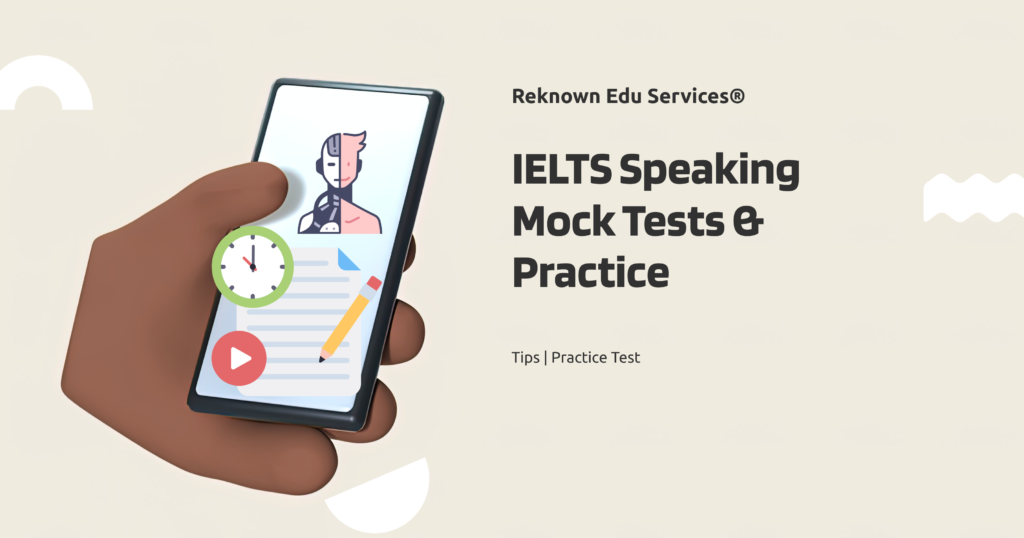
The Value of IELTS Speaking Mock Tests
Participating in IELTS Speaking mock tests can be immensely useful in your preparation for the actual exam. Here’s why.
Mock Tests to Assess Speaking Skills
- Mock tests offer the perfect opportunity to evaluate your speaking abilities and identify areas for improvement. They simulate real exam environments and enable you to practice speaking fluently and coherently under timed conditions with greater ease.
Familiarization with Test Format
- Mock tests provide you with an opportunity to familiarize yourself with the structure and format of the IELTS Speaking exam, including sample questions and timing guidelines.
- By practicing these sections before exam day arrives, mock tests help prepare you to meet what to expect on test day.
Feedback and Areas of Improvement
- Mock tests typically feature feedback from instructors or evaluators that provides valuable insight into your performance as well as areas where improvement may be needed, such as vocabulary usage, grammar usage, pronunciation accuracy or coherence issues.
- This feedback also enables you to quickly identify specific weaknesses and work on them effectively.
Time Management Skills
- As with most timed tests, the IELTS Speaking test requires you to manage your time efficiently in a limited period of time.
- Mock tests help develop time management skills by practicing within set time limits – this ensures you allocate sufficient time for each section and complete responses within specified timesframes.
Strengthen Your Confidence
- Regularly taking mock tests can boost your confidence and lower test anxiety.
- With practice comes comfort with both test format and speaking tasks – this translates into improved performance during an actual exam, as you’re better prepared to manage pressure while showing off your language skills effectively.
Enhancing Fluency and Coherence
- Mock tests provide an opportunity to increase fluency and coherence in spoken English.
- By practicing speaking on various topics with feedback from your instructor, mock tests allow you to hone your fluency by practicing on fluency exercises that engage various topics.
- You’ll work toward more fluent expression of ideas while organizing them coherently and connecting your arguments logically.
Test Strategy Development
- Mock tests allow you to formulate effective strategies for handling various question types and speaking tasks.
- By trying out various techniques such as linking words, structuring responses or providing examples and seeing their impact on performance, mock tests provide you with an invaluable opportunity for exploring strategies until finding ones that best suit you.
Overall, IELTS Speaking mock tests can be invaluable tools in your preparation for the IELTS Speaking exam. By providing an accurate simulation of test conditions and providing feedback for improvement, mock tests provide confidence-building practice as you become acquainted with its format.
By frequently practicing mock tests you can refine your speaking abilities while identifying areas for development – all leading to increased chances of obtaining higher band scores on IELTS Speaking exam day.
Effective Use of Speaking Cue Cards in Practice
Effective IELTS Speaking Cue Cards Practice can play an essential part in improving speaking abilities and optimizing exam performance. Here are a few strategies for getting the most from your cue card practice session:
Acquaint Yourself With Cue Card Topics:
- Take some time to familiarize yourself with a wide range of cue card topics frequently seen during IELTS Speaking tests so you feel more at ease and secure when faced with unfamiliar ones during testing. Doing this will allow for increased comfort when facing new topics during an exam.
Understand the Cue Card Prompt:
- Read carefully through your cue card prompt in order to fully grasp what it requires of you, noting any themes, topics, instructions or questions mentioned within it.
- Plan and Arrange Your Response: Before beginning speaking, take some time to plan and organize your response.
Make the Most of One-Minute Prep Time:
- Take full advantage of one minute prep time by noting keywords or phrases to help remind yourself about each point to discuss, thus keeping on topic and covering every facet of a cue card topic.
- Provide Exhausted and Relevant Details: When discussing a cue card topic, aim to provide extensive and relevant details.
Utilize Different Vocabulary and Grammar Structures:
- Exhibit your language proficiency by making use of various vocabulary and grammar structures, from descriptive words, idioms, phrasal verbs and complex sentence structures to make your response engaging and showcase your language abilities.
Focus on Fluency and Natural Speech:
- Strive for fluid and natural speech by eliminating long pauses or hesitations by filler words such as, “well,”, “you know” or “basically.” Practice speaking at a moderate pace aiming for conversational tone.
Practice Time Management:
- While practicing cue cards, pay close attention to timing. Since IELTS Speaking tests are timed exams, you must submit responses within their given timelines.
- Practice for two minutes on each cue card in order to develop timing sense and ensure you cover all relevant points effectively.
Record and Evaluate Practice Sessions:
- Record your practice sessions using either your smartphone or voice recorder in order to review performance, identify areas for improvement, as well as assess pronunciation fluency and coherency. Doing this will allow for further introspection into how well they went!
Engage In Feedback and Guidance:
- Seek feedback and guidance from experienced IELTS tutors or language specialists as often as possible to gain valuable insights, correct any errors, and offer tips to enhance performance based on IELTS Speaking Band descriptors.
Utilizing IELTS Speaking cue cards effectively in practice sessions will allow you to build confidence, sharpen speaking abilities, and increase the chance of attaining a higher band score on the IELTS Speaking exam.
Speaking Test Questions for Your Mock Tests
Here are some sample IELTS Speaking test questions that you can use for your mock tests
Part 1:
- Do you work or are you a student?
- What do you enjoy doing in your free time?
- How often do you hang out with your friends?
- What kind of music do you like listening to?
- Have you ever watched a foreign film or TV show? Which one?
(Cue Card) Part 2: Describe a memorable trip or vacation you have been on.
- Where did you go?
- Who did you go with?
- What did you do there?
- Explain why it was memorable for you.
Part 3:
- What are the advantages and disadvantages of traveling alone?
- How does traveling to different countries help in understanding different cultures?
- What are some of the impacts of globalization on the tourism industry?
- How has technology changed the way people travel?
- In your opinion, what are the benefits of experiencing different cuisines when traveling?
These sample questions cover different topics and give you an idea of the types of questions you may encounter in each part of the IELTS Speaking test.
Use these questions during your mock tests to practice and improve your speaking skills, fluency, and ability to express your ideas clearly.
Additional Resources
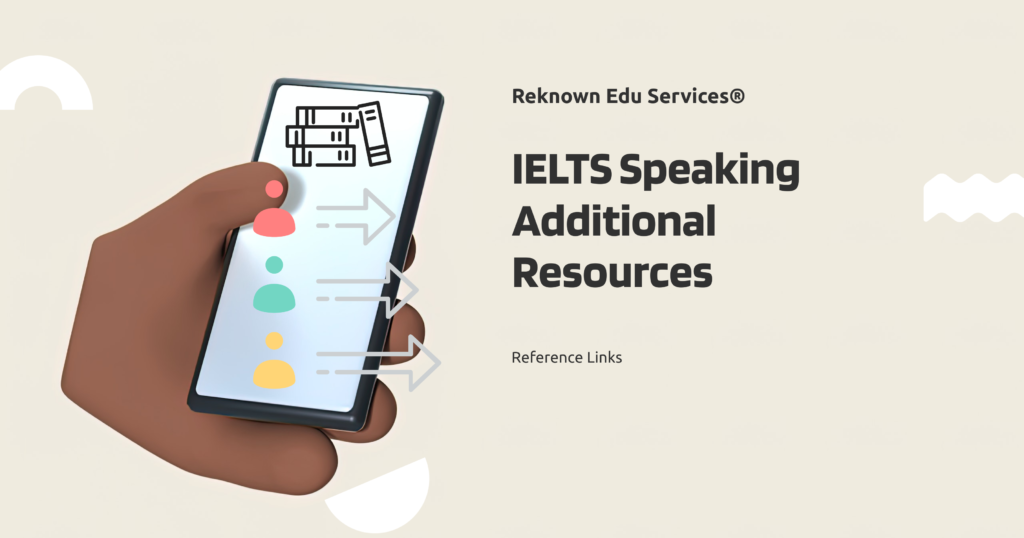
Here is a list of free resources that can be helpful for individuals looking to improve their IELTS speaking skills:
Phase 1
- British Council: The British Council offers free online resources such as practice tests, videos, and tips for taking the IELTS speaking test.
- IELTS Liz: IELTS Liz is a website run by an IELTS examiner herself, IELTS Liz offers free materials including video lessons and tips to improve speaking abilities.
- IELTS Advantage: This website offers free tips and strategies for passing the IELTS speaking section, including advice on answering different types of speaking questions.
- YouTube Channels: There are various YouTube channels devoted to IELTS preparation, with popular ones including “IELTS Speaking Success” and “IELTS Master”.
Phase 2
- TED Talks: Watching TED Talks can help develop both listening and speaking skills. Try imitating the speakers’ pronunciation, intonation and speaking styles as inspiration.
- IELTS-up: This website offers free IELTS speaking practice tests and strategies for reaching high scores on this section of the exam.
- EngVid: EngVid offers free English video lessons focused on speaking, vocabulary development and communication skills – making them particularly helpful for IELTS exam preparation.
- Speak English with Tiffani: This YouTube channel offers videos on various English speaking topics that can help IELTS speaking candidates develop their speaking skills.
The Phase 3
- IELTS Simon: Run by an ex-IELTS examiner, this website offers free lessons and advice for all parts of the IELTS exam – including speaking practice!
- Cambridge English: The official Cambridge English website provides free sample tests and resources on their official website.
- HelloTalk App: This is a language exchange app where native English speakers will provide correction for your sentences – making this very helpful in practicing speaking.
- IELTS Podcast: This provides strategies, tips, and practice exercises for IELTS speaking section tests.
Note that, while using these resources, it’s vitally important to actively practice speaking English. Speak out loud as much as possible in English while recording yourself, and listen back through recordings to identify areas for improvement. But please keep a few things in mind while doing this:
- Updated Content: While the key concepts and strategies of IELTS speaking remain consistent, always look out for updated material on YouTube channels and podcasts as these often update their materials to accommodate any alterations to the exam.
- Exercise With Recent Questions: It is wise to familiarize yourself with current IELTS speaking exam questions by practicing with recent ones, as this will give an idea of the types of questions currently asked in the exam.
- Official IELTS Resources: As official partners of IELTS, British Council and Cambridge English ensure their materials remain up-to-date and reliable.
- Engagement With Online Communities: Consider joining forums and social media groups dedicated to IELTS preparation so as to gain feedback from others who are also preparing for the test in 2023. Doing this will give you access to feedback from peers preparing for this year’s exam.
- Technological Tools: By 2024, new apps or technological tools may become available that will aid with language learning and IELTS preparation. Keep an eye out for these.
- Personalize: Remember that what works for one person might not work for the next; therefore it is crucial that you discover resources and strategies tailored specifically to your learning style and preferences.
Employing these timeless resources with an awareness of recent changes and an individualized strategy, you can successfully prepare for the IELTS speaking test in 2023.
💡TIRED OF GIVING MULTIPLE IELTS EXAMS? Clear your IELTS exam with the help of chatGPT empowered classes?
Recap: Your Roadmap to IELTS Speaking Success
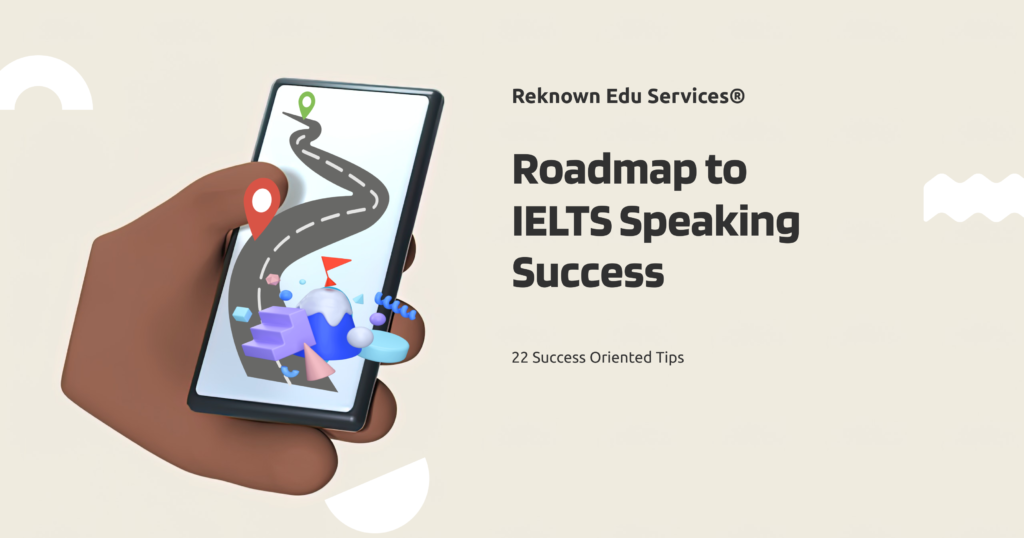
Phase 1
- Understand the IELTS Speaking Test Structure: Become acquainted with all three sections of the IELTS Speaking test: Part 1, Part 2 (Cue Card), and Part 3. Familiarize yourself with what to expect during each stage and allocate enough time for each section.
- Know Your Assessment Criteria: Review IELTS Speaking Band Descriptors as they will be used to judge your performance on test day. Understand what criteria exist for each band score (6, 7, 8, or 9) as well as what examiners expect of your responses.
- Expand Your Vocabulary: Expand your vocabulary by learning new words and phrases related to various subjects. Build up a robust vocabulary arsenal so you can express yourself accurately and fluently during tests.
- Practice Regularly: Regular practice sessions and mock tests are key for developing your speaking abilities. Engage in mock tests and practice sessions that replicate real test environments; utilize sample questions and cue cards for timed answering exercises to practice answering within given deadlines.
- Improve Fluency and Coherence: Work towards developing your speaking fluency and coherence by practicing at a natural pace, using linking words or phrases to connect ideas and thoughts seamlessly, keeping a logical flow throughout responses.
The Phase 2
- Improve Pronunciation and Intonation: Focus on improving both pronunciation and intonation to create clarity in your speech. Pay close attention to word stress, sentence stress, and intonation patterns while practicing speaking using correct pronunciation for optimal speaking performance.
- Time Management in IELTS Speaking Test: Adequate time management is crucial when taking an IELTS Speaking exam. Use each part of your given time wisely and practice answering questions within that allotted limit so that all points can be covered effectively.
- Mind Your Grammar and Accuracy When Speaking: Pay close attention to both grammar and accuracy when speaking aloud, using various grammatical structures and tenses appropriately while striving for accuracy while avoiding major errors in speech production.
- Listen and Respond to Examiner’s Questions: Actively listen and respond appropriately to any of the examiner’s queries, providing relevant details directly as an answer or support. Take note of any prompts or follow up questions by the examiner.
- Maintain a Confident and Calm Atmosphere: Throughout your speaking test, keep a confident yet calm demeanor. Even when responding to challenging questions, stay composed and confident when answering.
- Do not forget to breathe deeply when necessary or take short pauses as necessary.
- Understanding the IELTS Speaking Test Format: Familiarize yourself with the IELTS speaking test format, including types of questions and their assessment criteria. Engaging With Actual Questions: To simulate real IELTS exam conditions, practice speaking using recent speaking questions for IELTS exams.
Phase 3
- Utilize Free Resources: Take advantage of free online resources such as the British Council, IELTS Liz and Advantage courses as well as YouTube channels like IELTS Speaking Success or Speak English with Tiffani to enhance your studying of IELTS or English for conversation purposes.
- Watch TED Talks: Broaden your listening and speaking skills by watching TED Talks, mimicking speakers’ pronunciation, intonation and speaking styles.
Engage in Language Exchange: Utilize apps such as HelloTalk to chat with native English speakers and receive feedback. - Record Yourself: Keep an audio recording of each speaking practice session you undertake, and evaluate them critically to identify areas for improvement.
- Consult Official IELTS Resources: To remain up-to-date and reliable materials for IELTS exam preparation, utilize resources provided by official partners like British Council or Cambridge English as official IELTS partners.
- Engage With Online Communities: Take part in forums and social media groups dedicated to IELTS preparation to exchange experiences and obtain feedback. Keep Up With Technological Tools: Be on the lookout for new apps or tools that may assist with language learning or IELTS test preparation.
- Invest in Quality E-Books: Reknownedu.com offers invaluable e-books that are invaluable resources, such as the “Ultimate IELTS Speaking Bundle” and other guides with detailed topics, Q&A sections, and techniques designed to improve vocabulary, coherence and fluency – investing in these e-books means investing in your future success!
- Personalized Learning: Tailor your preparation strategy to best match your learning style and preferences. Consistent Practice: Regular speaking practice sessions should be set aside daily for optimal performance.
Remember, success in the IELTS Speaking Test doesn’t rest solely upon memorization – it lies with effective communication in English. Arm yourself with all the right tools, strategies, and resources, and embark on your journey toward IELTS Speaking Excellence – your success awaits! Your Next Steps: From Preparation to IELTS Speaking Mastery.
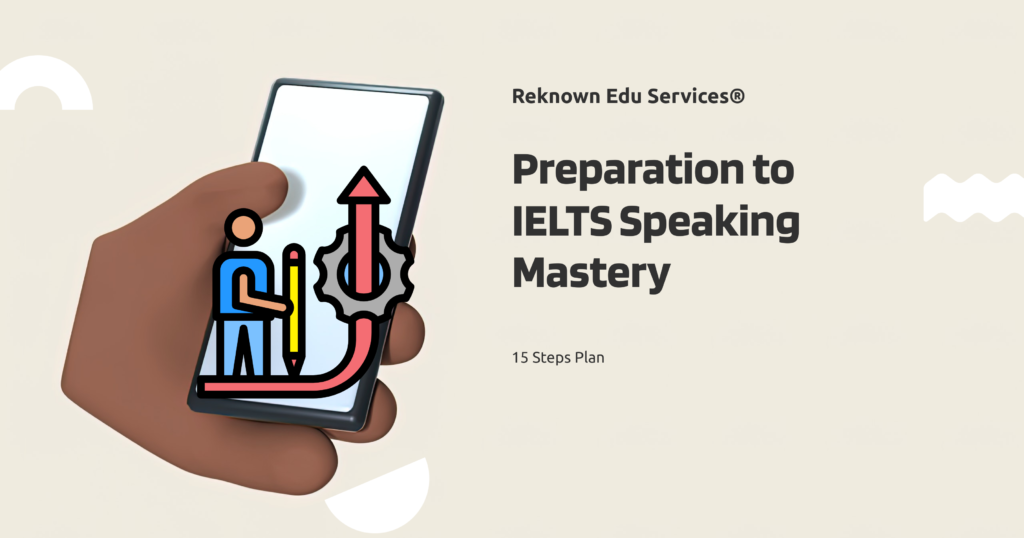
Preparing to take the IELTS speaking examination requires a detailed plan. Here are three Major Stages on your journey towards IELTS mastery through speaking:
Stage 1
Step 1: Establish Clear Goals Establish your band score goal and develop specific, measurable, attainable, relevant and time-bound (SMART) goals for IELTS speaking preparation.
Step 2: Familiarize Yourself with the Test Format
Learn the structure and components of an IELTS speaking test, including its three parts, types of questions and assessment criteria.
Step 3: Accumulate Resources Gather a variety of resources including free online materials, practice tests and e-books from Reknownedu.com that offer more in-depth preparation.
Step 4: Practice Regularly
Engage in regular speaking practice. Record yourself, participate in language exchange programs and join study groups.
Step 5: Focus on Fluency and Pronunciation
Focus on speaking fluently without too much hesitation or interruption from internal monologue. Pay special attention to your pronunciation and accent issues in an effort to reduce their severity.
Stage 2
Step 6: Increase Your Vocabulary
Build up your vocabulary through reading widely and making note of useful phrases and expressions.
Step 7: Assess Coherence; Utilise Connecting Words
To increase coherence within your thoughts and create greater unity of thought. Use linking words as bridges between ideas.
Step 8: Get Feedback Have someone with experience listen and provide feedback about your speaking practice.
Step 9: E-books Provide In-Depth Preparation
Make an investment in quality e-books like the “Ultimate IELTS Speaking Bundle” from Reknownedu.com that offer expert insights, strategies and practice questions designed to help you master IELTS speaking.
These e-books contain insights, strategies and practice questions which are invaluable in mastering IELTS speaking.
Step 10: Take Mock Tests Practice your exam environment by taking full-length mock tests to gain familiarity with time management and test format. Doing this can help manage time more effectively while getting used to taking exams.
Stage 3
Step 11: Review and Adjust
As soon as each practice session or mock test concludes, take time to reflect on your performance and identify areas for improvement in order to tailor your preparation strategy accordingly.
Step 12: Stay Positive and Confident
Maintain a positive mindset. Confidence is essential in the speaking test, and believe in yourself and your ability to succeed.
Step 13: Test Day on Time
Arrive early, stay calm, and remember the techniques you have been studying in preparation for this test. Focus on clarity, fluency and coherence during this crucial session.
Step 14: Post-Test Reflection
After taking your test, take time to assess its experience. Even if you don’t reach the score that was desired, use it as an opportunity for growth and consider it a lesson learned.
Step 15: Plan for the Future
If you have achieved your desired score, begin planning for the next steps in your education or career. If not, don’t become disheartened. Analyze what went wrong and prepare for another attempt.
Remember, becoming a master at IELTS speaking is an ongoing journey that requires dedication, the right resources and an optimistic mindset – but with hard work, dedication and the proper mindset you can reach excellence! Best wishes on your endeavor!
